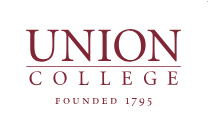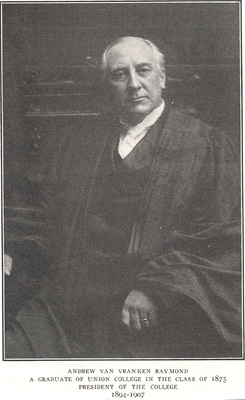The Raymond Family
Andrew Van Vranken Raymond Union College President
(August. 8, 1854 – April 5, 1918)
Union College Class of 1875, President, 1894-1907
Andrew Van Vranken Raymond was born Vischer’s Ferry, New York, the son of a Dutch Reformed Minister. He entered Union College in 1872 as a sophomore in the classical course. There he joined the Alpha Delta Phi fraternity and the Adelphic Society; he was an editor of the College Spectator, a popular orator, and an impressive athlete. After graduation he went on to New Brunswick Theological Seminary and was ordained as a Dutch Reformed Minster in 1878. While there he also managed to be the captain of the Rutgers football team, a feat that would have been rendered impossible under the new athletic eligibility rules instituted during his presidency at Union.
Raymond married Margaret Morris Thomas (see below) in 1879. After service at several churches in New Jersey, he switched denominations and came to Albany to become pastor of the Fourth Presbyterian Church in 1887. His association with his alma mater was renewed when Union College President Harrison Webster asked him to preach at the College; and he soon became president of the General Alumni Association. After Webster stepped down as President in 1894, Raymond was unanimously elected to be his successor. He hesitated for a few weeks, reluctant to leave the church, but was inaugurated that spring.
Raymond came to his presidency with a firm belief in the kind of education Union offered, but he was also faced with a dire financial situation, aging campus buildings, and poor morale among faculty and alumni. Raymond set to work with great energy doing everything he could to improve the situation, earning the nickname of “Very Vigorous” for his efforts (and his middle initials). He shepherded the College thorough numerous retrenchments dictated by its Board of Trustees as well as an unsuccessful attempt to move it to Albany, obtained important donations, made several wise appointments in terms of faculty and administrators, and reinvigorated its curriculum in several areas, most notably through the development of the electrical engineering program. He also tried to keep the atmosphere at Union peaceful, not always an easy task. He was successful in his efforts overall, however, and when he left to return to the ministry after the death of his wife in 1907, Union was free of debt, had increased attendance, and was much richer in buildings, resources and friends as alumni regained their faith in their alma mater. Union awarded him an honorary DD degree in 1887 and an LHD in 1908.
Mrs. Perkins, a close friend of the Raymond family, understood the challenges of the president’s job and often expressed sympathy for him and defended him from his harshest critics. She reported, for example, that she did not think that other people appreciated how many opportunities to rejoin the church Dr. Raymond had turned down in order to stay at Union. She was not always completely supportive, however, writing, If:
Dr. Raymond would give the Dean power, and uphold the Faculty, all might go well, but he is away all the time, really knows nothing about the boys, or the details of anything, and yet will not give the power to any one else (March 30, 1901).
Although she sometimes had doubts about his ability to raise money for the College, she never doubted that he was a good man.
Raymond was active in many areas apart from his direct responsibilities. He maintained his interest in athletics and became an avid golfer, often playing on a makeshift course on Union’s Pasture with Edward Everett Hale Jr. He also served in a leadership capacity in many other civic, educational, and religious organizations. After leaving Union he was installed in a new pastorate in Buffalo, leading his congregation with great success for the next eleven years. He died, much mourned, in 1918 in Spartanburg, South Carolina, while visiting one of his sons.
Margaret Morris Thomas Raymond
Wife of Andrew Van Vranken Raymond
Margaret Morris Thomas was born in Wales but came to Middleville, New York with her parents when she was a young child. Educated at the Oswego Normal School, she married Andrew Van Vranken Raymond on September 24, 1879, and went to live with him in Paterson, New Jersey. Eventually the Raymonds had three children: Morris Thomas, Miriam Hotchkiss, and Andrew Van Vranken Jr. Both of the boys graduated from Union, and Miriam attended Vassar College.
In the fall of 1894, Mrs. Raymond became the mistress of the President’s House on the Union Campus, which became her home for the rest of her life. She quickly assumed a leading role in the life of both the College and the city of Schenectady, taking as her charge the promotion of good feeling among the students and faculty and between the College and the town. Among the many testimonials to her success was the view expressed in the student newspaper shortly after her death:
She was absolutely true to her friends as to her college, church or town. She showed this loyalty, not merely in keeping interested in the lives of others but in seeking to share with them the intellectual and artistic interests that were her own keen delight (Concordiensis, June 15, 1907).
Mrs. Raymond’s position, warmth, intelligence, and interest in art and literature made her one of Mrs. Perkins’ closest friends. She is mentioned frequently in the letters, discussing current affairs at the College, insisting that Mrs. Perkins attend social events, asking her to give lectures, or extending various kindnesses to the Hale/Perkins families. Mrs. Raymond helped out greatly when young Maurice Hale had scarlet fever, for example, and she stayed with Mrs. Perkins after her husband’s death. She also often invited Mrs. Perkins to go on her trips with her, although the older woman was not always able to accept. Mrs. Perkins frequently noted that Mrs. Raymond was traveling or sick or commented that the other woman did too much, once saying:
She looks dazed, like a ghost walking about, or like some one who took a drug, which she does not. She is really killing herself (June 23, 1904).
Mrs. Perkins was possibly right about the ways in which her friend was overtaxing her strength. Constantly hosting dinner parties, lectures, and concerts in her home, Mrs. Raymond was a social woman whose unselfish devotion to the College was perhaps most poetically expressed in her desire that her last illness would not interrupt anyone’s usual activities, even hoping that her death would be postponed until after Commencement so that the festivities would not be ruined. Eventually she became confined to her house and died on the morning of June 11, 1907 (Alumni Day).


